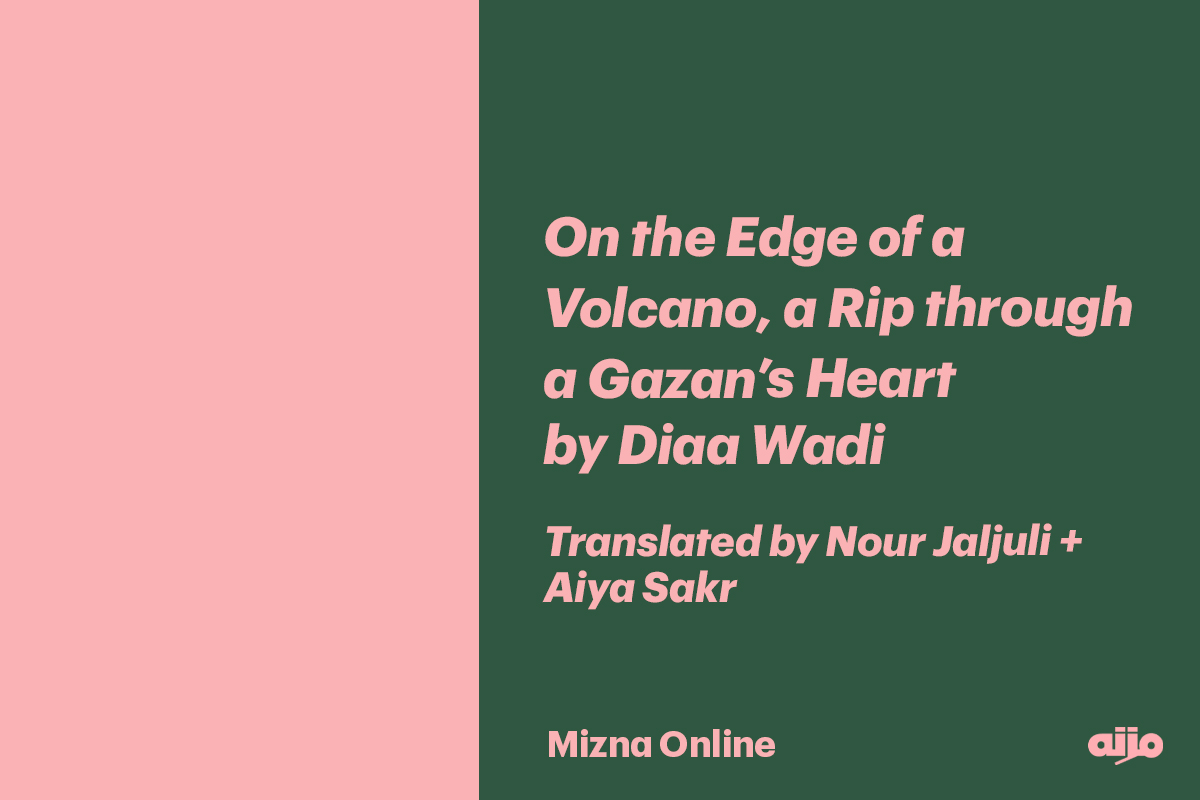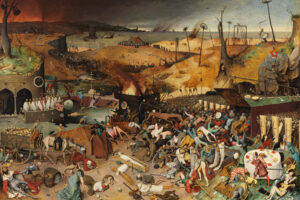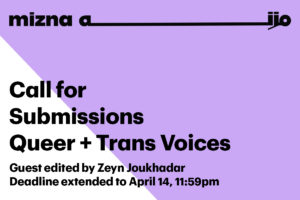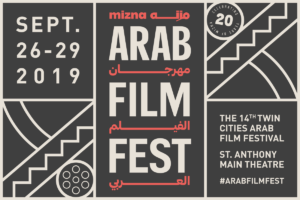
February 18, 2025
On the Edge of a Volcano, a Rip through a Gazan’s Heart
trans. by Nour Jaljuli & Aiya Sakr
It was April of 2024 that Mizna first published Diaa Wadi’s essay “Autobiography of Gaza”. Back then, executive editor George Abraham reflected that “‘ceasefire’—a bare minimum demand back in October—has come to lose all meaning as the horrors of Al-Shifa Hospital and other Zionist massacres unravel before our eyes . . .” Now, in January of 2025, we find ourselves yet again grappling with what it means to cross that threshold marked by whatever it is a term like “ceasefire” could ever hope to signify some 460 days and tens of thousands of casualties of zionist genocide later. We again urge all readers to consider donating to Diaa Wadi’s campaign to evacuate his family to safety.
—Nour Eldin H., Mizna assistant editor
Should I tell you a secret?
I’m afraid of the anguish I hold within me. Do people fear their own anguish?
—Diaa Wadi (trans. Nour Jaljuli & Aiya Sakr)
On the Edge of a Volcano, a Rip through a Gazan’s Heart
This grief is larger than anything I can bear. My eyes shatter from what I witness and my brain withers with the endless thoughts and storms of my own imagination.
I write these words while my heart rings like an alarm with fear and anxiety. I write as the Occupation’s artillery shells and war missiles drop on my family. But now, people see these bombs as raindrops, not tons of explosives and fires eating at Gazan bodies, souls, and buildings.
It is the worst of times. People are being slaughtered—mounds of flesh fill the streets and homes. People in the south of Gaza have turned into the new object of slaughter, while in the north, slaughter joins starvation and thirst. Monumental exhaustion weighs down my tongue.
I imagine them now, spread across the corners of the tent with burnt edges. An empty tent with only gravel and stone. Each of them holding onto their suitcases, their documents, and their few belongings. They stare at each other. Fear sits with them as they wait for the end with each minute. They remember the moments they shared with their beloved martyrs, every person who left to the sky. They remember the warm family gatherings, loud laughter, daily bickering. They wonder, “Will the day ever come when we argue again, and storm out of our home?” But there’s no home left, no fights, it’s all rubble and ruin—ruin beyond anybody’s description.
I am now reading through reports and searching the faces of survivors and the names of martyrs from al-Shuja‘iyya neighborhood to find out what has become of my uncle, his wife, and their children after connection has been lost. I look for them so I don’t come across their pictures and names by accident as I had before with my martyred aunts and uncle.
Can you understand? You can’t understand and you will never know.
Death came near a few days ago. All of my senses were heightened. Except sight. I didn’t need my ears to hear, the voices were coming from inside of me and from the outside too. I spent my life trying to adjust, to heal from the torments of previous wars. I thought they would face no pain after I left them. Didn’t I do it for their sake? To protect them from harm and need? Did I not suffer distance, rejection, and lonely laboring to provide them with all their wishes?
Now, evil is growing. What is happening in Gaza is a genocide, a policy for organized mass killing. This is terrorism and ethnic cleansing. This is organized state terrorism. And my family is there. They are there with all of my people of Gaza suffering through wounds that can swallow a world whole. Fifty thousand martyrs. Life itself will end before we’re able to adequately mourn each and every one of them. The wounded are in every street, remnants strewn across rocks and trees, dogs are gnawing at the living and the dead, and helplessness is amputating every living part inside of us.
This is the truth that beats at us: that this unlawful attack is a mere tool to erode our very sense of self, to plow out of us every concept, idea, and belief; it is the complete disregard of all useless laws laid out in ink on paper. What is happening in Gaza singles us out, a dignified people kneaded with death, a people whose fate is folded in with facing tragedy alone. This is nothing new in our cycle of setbacks. We don’t know fear and we don’t surrender to any weakness, even if it was the color of blood.
As for you, living outside the borders of these bombs, know that there is no room for a middle ground. You are either a person of honor defending against our pain with your blood, words, voice, and arms, or you are stuffed with filth, apathy, and so-called neutrality.
The greatest agonies in a person’s life happen during childhood and adolescence—not because of their relative weakness at that age, but because the concepts that may aid them to bear these pains have not yet formed and taken root within. So pain shapes and mutilates their thoughts as it wishes. My life in Gaza was filled with anguish of many forms and shapes. The war of 2008, another one in 2012, 2014, 2021, and now this war—a war a thousand times more violent than anything that has ever preceded even though I am not there.
Helplessness, grief, and loss mold a weapon that stabs at my soul, my heart, and my stamina. This weapon reshapes itself, again and again. It pounds at me until I am debilitated. Every day I grow more certain that what was taken from Gazans cannot be retrieved—this is at the heart of our journey. And the ugly truth is that this sorrow is invisible. No eyes can track it. No one can gauge the size of the blow or how deep the wound runs.
Baraa, my brother, let’s play a game.
I will let you go to bed late, and I won’t worry over you swimming long laps in the sea. I will give you hours to play and I won’t smother you with advice. I will get you the phone you want. I won’t tell mom about some of your grades, and I will hide your shenanigans from the family—keep it all in my heart like a gentle breeze. You can have all you want and more. Under one condition, brother: that you don’t leave on my behalf.
“They cannot expel us unless they transfer our corpses to Sinai. This idea they have of us walking there is a fantasy.” This is what my father tells me before the internet and all communications with them are cut off. We will not leave, we will not have a tent in Sinai, and we will not look back at Gaza longingly from behind a fence. Death smells good in the face of the hell our souls are now subjected to.
An international call comes through.
To be honest, I fear nothing more than an international call with a Palestinian code. He says, “Another Baptist Massacre, Diaa.” He cries and hangs up.
Oh God, give us our old fear back. The one that vanishes when we see family and friends.
Give us our old sorrows and normal life. Give us everything that was and forgive us for complaining.
Give us normal fear just like all people. Oh God, only give us what is mundane.
My mother tells me that some of the women cut off their hair due to the lack of shampoo and cleaning supplies. They’ve been off the shelves for ages. Some have even cropped their children’s hair for fear of lice and parasites. They want to maintain their personal hygiene even if by the bare minimum.
What an unremarkable piece of news. No one will care. It doesn’t have the word “massacre.”
Take this advice from a bereaved soul—pray to God more because you have your children with you; hug your mothers more and sleep at their hands; take photos with your siblings and forgive them for their mistakes; hug your fathers, touch their faces and heads, and ask for their blessings; give your thanks to God that your mothers are nearby and safe and that your family is well. Others have had their hearts eaten by sorrow and the world tested them with what they hold dearest. I am others.
All of us are like this, with no exceptions. We each got our share of suffering, having to watch our families in tents, friends in hospitals, and their remains gathered in death bags.
Gazans have suffered every kind of torment there is. They’ve tried them all in order and they never stopped paying a dear and outrageous price the rest of the world cannot fathom. We pay with each passing second, literally, a hefty price no one in this time has ever paid. What falls on the heads of Gazans are lava balls of hatred, resentment, and a wish for our extermination. It’s a terrifying state that was never before experienced by anyone other than us in this modern day. Allah is almighty.
“Triers of pain,” that’s what Gazans are. We try pain, pain tries us, Gazan pain—what do you think? Are these titles catchy enough? Are they good enough for your fancy publications? Choose the most emotive descriptions and choose carefully. Take your time. This is not human blood. These are not real scenes. Stay neutral and don’t bother providing a single drop to those drinking filthy sewage water.
May whomever is standing on neutral ground fall. May they fall, those who didn’t give their money, or lend their voice, pen, tears, and prayers.
We are humans and we know sorrow. But this feeling isn’t sorrow, anguish, nor pain. This thing doesn’t have a name. Today, on the phone with my uncle, he responded with a single sentence, “We’re hungry.” I hung up immediately. I couldn’t bear it.
What does the world want? We will die of anguish!
Should I tell you a secret?
I’m afraid of the anguish I hold within me. Do people fear their own anguish?
They must fear their own anguish and resentment when there’s no way to relieve it, to dispose of it, or deal with it. A sort of anguish that repeats daily in larger and larger doses. An anguish that cuts the strings of my heart and now seeps into my very features and behaviors. An anguish that, if placed on a mountain, would shake it or even force it to collapse.
“Stockpiling crisis,” this is the state in which Gazans are living now. They remain steadfast in their homes despite all that has happened and happens every day.
Gazans are stockpiling their crises and sorrows, so that once this war ends, another can begin. A war no news channel will cover, a war uncapturable without bombardment. A war of trying to eat without ash, now a permanent resident in our mouths. A war of going out to the street without conjuring amputated limbs and heads split open. From the war of tanks and weapons is born another war to build a new life.
“Israel commits a new massacre in al-Nuseirat.”
“Israel targets an UNRWA school sheltering refugees.”
“Israel buries children alive under the school rubble.”
“Israel kills entire displaced families inside the school.”
The world must understand that Palestinians, even when they carry weapons, are always the righteous ones, and that Israelis, even if they are lounging on the beaches of Haifa, are always guilty.
They have barely entered life’s threshold; they don’t have passports. They know the world only through screens. They know nothing outside of the wall. No trains, no civil planes, no mall escalators. They don’t know a boat or the sea without siege. They don’t know.
Baha, Alaa, Bara, and Mohammad, my brothers, don’t know.
After the war on Gaza, mothers will ask about their children’s graves.
If a mother wishes to sit by her son’s grave, “Where’s my son buried?” I don’t know. All I know is that this is a mass grave. Perhaps your son is here or there, or perhaps his parts are bagged together in a different mass grave.
You don’t know the meaning of anguish. You cannot understand what it means for your family to sleep on sand in a tent on the coldest and hottest days of the year. You cannot understand what it means to not find a bathroom to go to when you need it. You don’t understand the meaning of all of this. If we place all of this sorrow in a basket over your head none of you will be able to bear it.
This basket of sorrows is too heavy.
My brother Mohammad tells me that at the beginning of the war he only missed home, but now he misses opening the fridge door, sleeping in his own bed, and turning the lock on our front door.
He tells me about his discoveries in this war, “The thing is, you will long first for the main thing—our home. But then you start thinking about details that never crossed your mind, like opening the fridge.”
Mohammad, let’s play a game.
When we hear the bombs, we run.
Whoever gets tired loses the game.
I never imagined being on the outside of the war; the war that never left us. Loss and helplessness increase with the distance. Keeping up with the war through windows and streets would have been easier than constantly flipping between screens, news channels, images of martyrs, tracking neighborhoods, and endless phone calls, one after the other.
All that I do these days is try to find a way to describe how I feel. At least that way I will be able to hold the keys of knowledge and understand, even just a little, how my mind and heart can settle.
Choice turns into a daily hardship. Especially with the tremendous number of choices we must face in every moment of our lives.
But the choices this time are not only confusing, they’re deadly. Either your flesh is shattered to pieces, or you escape your home with no guarantee that you’ll even survive. You either suffer starvation and fear in the north, or the anguish of living in a tent with its unbearable heat in the south.
But the world did its best to aid us. The world was too generous and offered us a long list of choices: to be killed, or displaced.
Oh Gazan, what do you think? Should you die by a missile that will turn you into pieces no larger than a finger, or do you want to die with your limbs amputated by a bomb?
No, you still have another choice, a lucky choice: to die whole. What do you say if a bullet should hit you between your shoulders, ripping through your body?
Language has changed, and words mean different things now. Children know school as a place of learning, boring math lessons, and a yard where they can run and play. But now school has become a shelter, a place where you sleep surrounded by carpet bombings and shelling. Mohammad tells me he won’t be able to go to school after the war. The only thing he’ll be able to see are images of him running between bombs to reach shelter in the same school he had once loved and studied in. This is the trauma that children won’t be able to escape.
There are moments when one is forced to question their own sanity. How did I endure all of this harm, my soul as clean as a bird’s? You are shocked by your own ability to endure, and are afraid you will suddenly collapse for no reason after having to bear all of this.
They peeled away all of my loved ones. I remain naked and alone, pretending that “strength” is the only life raft available to me.
After once shivering at the thought of us turning into mere numbers, shame has led us to see the genocide as some sort of victory because the Occupation failed to achieve its goals.
I am as silent as a lamb. I only speak when necessary, or I nod my head. I don’t talk much, and I wait for the night to look for them in my dreams. Last night, I saw them walking to the west, carrying their things. With every kilometer they walked, they would cry all at once to lighten the load. Off they went, no one knows where they are now. Perhaps they were killed or maybe they’re still walking. I don’t know if they have enough tears to see the journey through.
Humans have always been more brutal than animals. Even preying animals only eat because they’re hungry. But what is wrong with humans? Are they even humans, or monsters cast upon us?
I don’t know what to tell you about Gaza now. But the road to heaven is crowded in Gaza.
The great poet Al-Muari once wrote upon losing a dear one, “My sadness over his departure is like the blessings of the people of heaven, it’s born anew every time it runs out.”
The tears that fall by accident are the voices of loved ones preserved in our bodies after they leave us. They fall whenever the heart longs to hear their voice and has no other way to find it.
They disperse between bombs. Some survive and leave elsewhere. Death by scorched earth policies, families exterminated by every kind of weapon and tool, from missiles to vicious dogs, each dies according to their own fate.
Perhaps in heaven when martyrs come together, they will tell each other about how they died.
“How did I pass? By a missile.” Another says, “I was killed by a bomb,” and a child responds “Uncle, a sniper shot me.”
Diaa Wadi is a Palestinian writer and blogger. He studied mechanical engineering and has traveled to many countries speaking for the Palestinian cause at international events. Wadi believes in literature and writing as an effective tool of resistance against the Occupation. He writes about the life of Gazans and the details which are often overlooked by the camera. As Refaat Al-Areer said, “If I must die, / you must live / to tell my story.” Diaa writes on behalf of all those who left us, to honor the martyrs and send them eternal love—for the martyr Refaat Al-Areer, now more than ever. Diaa tweets @diaawadi2.
Nour Jaljuli is a translator and poet traversing between the worlds of Arabic and English. She holds an MA in literary translation from the University of East Anglia and is the Arabic translator of Rana Dajani’s Five Scarves. Her translations have appeared in ArabLit, Middle East Eye, Jummar, and the 2022 UEA MALT Anthology for which she was also coeditor. You can find out more about her work on nourjaljuli.wordpress.com.
Aiya Sakr (she/they) is a Palestinian-American poet and artist. They are the author of Her Bones Catch the Sun (The Poet’s Haven, 2018). A Pushcart Prize nominee, her work has appeared in Foglifter, Mizna, The Rumpus, and elsewhere. She is a co-organizer for In Water and Light, a regular community building space and reading series for Palestine. She is also a Winter 2023 Tin House Fellow, and has served as Poetry Editor for Sycamore Review. They hold an MFA in Poetry from Purdue University. She collects buttons, and is enthusiastic about birds.

Toward a Free Palestine: Resources to Learn About and Act for Palestine
We are proud to present this text as part of a list of resources to take action for and learn about Palestine, as well as works by Palestinian artists, writers, activists, and cultural workers.












